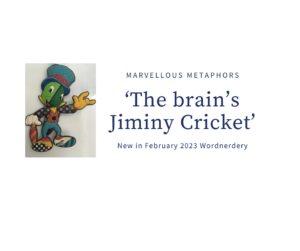 Metaphors are marvellous when you want to explain something complicated, give an idea of size, make a point memorably – or just make someone smile.
Metaphors are marvellous when you want to explain something complicated, give an idea of size, make a point memorably – or just make someone smile.
“An especially apt metaphor surprises and delights,” says author Jack Hart in A Writer’s Coach: An Editor’s Guide to Words that Work. “It opens new levels of meaning. It gives readers an incentive to move forward, confident that more rewards wait somewhere ahead.”
Metaphors compare one thing to something “blindingly familiar, but completely unrelated,” says copywriter Mel Wicks. And it happens without using “like.” So not “She was like a black sheep” but “She was a black sheep.”
My February newsletter, Wordnerdery, shares some examples I’ve collected:
“The prefrontal cortex is the brain’s Jiminy Cricket,” said [Dr. Robert] Lustig. “It keeps us from doing stupid things.” – quoted in The Power of Fun: How to Feel Alive Again by Catherine Price
“The concentration of contamination from volatile phenols he’s watching out for is measured in amounts as little as just 10 parts per billion. ‘So a teaspoon of smoky aroma in an Olympic-sized swimming pool.’” – Ghada Alsharif on the effect of wildfires on wineries in B.C.
“That night, as we sail along the shoreline, I step out from our skylit cabin into the dark coffin of the hallway just as the ship rolls in the trough of a wave.” – Andrea Pitzer via Nieman Storyboard
“But once we mastered Mr. Greco’s rules — learned who from whom, and whatnot — they were liberating. He taught us the masonry of language. Now we could build whatever we liked.” – Catherine Rampell, The Washington Post
“Facebook has downgraded its built-in search functionality from a Cadillac to a three-wheeled skateboard over the past few years.” – Ren LaForme in the Poynter newsletter, Try This
“Two summers ago, I was in Russia, on a comma of rocky Bering Sea beach called Napkum Spit.” – Bathsheba Demuth in The Atlantic
“Scraps of pottery often litter archaeological sites. Akin to today’s ubiquitous plastic, earthenware is ‘the nonbiodegradable polymer of the ancient world,’ says biogeochemist Richard Evershed.” – Carolyn Wilke in Knowable Magazine
Where do you find ideas?
“Use the world around you as a playground to stretch your skills at using analogy and metaphor,” says Pulitzer Prize-winning writer and editor Jacqui Banaszynski. She tries to reach for metaphors drawn from sports, fairytales, parables, nature, music, historical figures, Hollywood stars and more.
Have you spotted any great metaphors lately? Please share! I’m always on the lookout for examples.
Wordnerdery is a quick read about words, effective/expressive writing, newsletters and more. Are you a subscriber yet? If yes, thanks for reading! If not, you can sign up right now. In keeping with Canadian and American anti-spam laws – and just plain good manners – you can easily unsubscribe any time.
